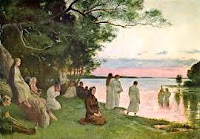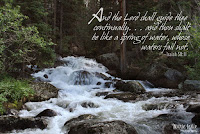It is fitting that the
celebration of Christmas, the coming of the Christ Child, happens very near the
winter solstice, the shortest day of the year (in the northern Hemisphere). A
major part of this celebration is lights—in our houses, on our houses, our
streets, our churches. Yes, it is possible that the actual birth-day may have
been at some other time of the year, but it was God Himself who created the
seasons and the cycle of the year, and the symbolism is appropriate—the coming
of the Light of the World as we use more lights, and look forward to the longer
daylight.
Lamps were an important part of
the worship in first the Tabernacle in the desert, and later the Temple in
Jerusalem. We find the instructions for the lamps in Exodus 25, and the design
was used until the destruction of the Temple in 70AD. These were oil-burning
lamps, most commonly olive oil. These lamps had a stand with seven branches,
each topped with a pot for the oil. We see the lamp mentioned in I Samuel 3, in
the sanctuary at Shiloh, and it would have been part of the furnishings of the
Temple of Solomon. We find the lampstands mentioned as having been taken when
the Temple was looted by the Babylonians. We know they were replaced when the
Temple was rebuilt after the return from Babylon, around 400BC.
The lamps have an important
place in a major historical event in the period between the Testaments. At the
end of the historical and late prophetic books, we see the rebuilding happening
under the rule of the Persian Empire, which was conquered by Alexander the
Great, in 332BC. Unfortunately, Alexander did not live to actually rule his
empire; he died of a fever in Babylon, on his way back to Greece. His generals
split the empire between them, with Ptolemy based in Egypt, ruling Judea. There
was a large Jewish diaspora community in Egypt, and the Ptolemies got along
with them reasonably well. The Seleucids, who ruled from Syria eastwards, took over Judea in 198BC, and were determined
to bring Greek culture to their dominions, and wipe out the worship of God. It
got to a point where the Temple in Jerusalem was defiled by the sacrifices of pigs
on the altar. When a
Greek official tried to force a priest named Mattathias to make a sacrifice to a pagan god, the Jew
 murdered the man. There were reprisals, but in 167BC the Jews rose up behind Mattathias and his five sons (known as the Maccabees) and fought for their liberation. It turned into a guerilla war, and in 164BC they
were able to liberate Jerusalem and the Temple. When they were preparing a
ceremony to purify the Temple, they found that there was only enough consecrated
lamp oil for one day, and no way to provide more without the Temple up and
running. Miraculously, the oil lasted for eight days. This is still celebrated
as the Feast of Dedication, or Hanukkah, with the central symbol a
nine-branched lamp: eight days for the festival, and one to light the others. (In John 10:22-23, we see Jesus at this
Feast.) The original menorah in the Temple was a seven-branched lamp, but when
the Temple was destroyed in 70AD by the Romans, the golden lamp was taken to Rome
as loot, and has disappeared. There is a legend that the Temple menorah’s
central branch, which was always filled first, burned longer than the others up
until 40 years before the destruction of the Temple, which would be 30AD. I
wonder if that is related to the triumph of the Light!
murdered the man. There were reprisals, but in 167BC the Jews rose up behind Mattathias and his five sons (known as the Maccabees) and fought for their liberation. It turned into a guerilla war, and in 164BC they
were able to liberate Jerusalem and the Temple. When they were preparing a
ceremony to purify the Temple, they found that there was only enough consecrated
lamp oil for one day, and no way to provide more without the Temple up and
running. Miraculously, the oil lasted for eight days. This is still celebrated
as the Feast of Dedication, or Hanukkah, with the central symbol a
nine-branched lamp: eight days for the festival, and one to light the others. (In John 10:22-23, we see Jesus at this
Feast.) The original menorah in the Temple was a seven-branched lamp, but when
the Temple was destroyed in 70AD by the Romans, the golden lamp was taken to Rome
as loot, and has disappeared. There is a legend that the Temple menorah’s
central branch, which was always filled first, burned longer than the others up
until 40 years before the destruction of the Temple, which would be 30AD. I
wonder if that is related to the triumph of the Light! 



















